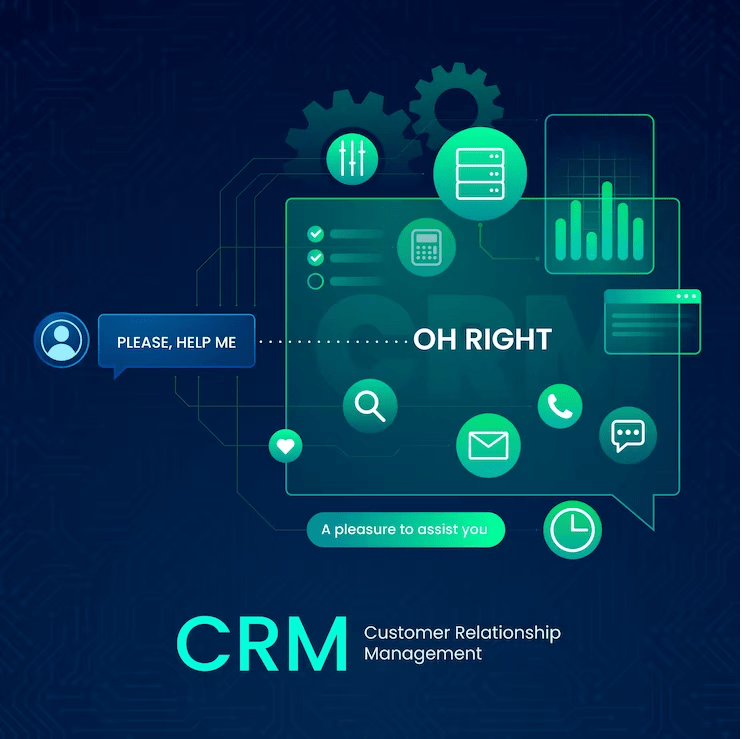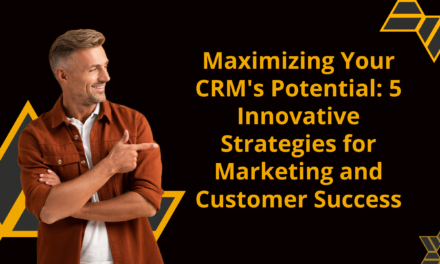In today’s fast-paced business world, where customer relationships hold the key to success, using a Customer Relationship Management (CRM) system has become essential for every organization. A CRM system is a powerful tool that helps businesses manage their interactions with customers, streamline processes, and gather valuable insights to make informed decisions. In this ultimate guide, we will explore in-depth how to use a CRM effectively to boost your business operations, enhance customer satisfaction, and drive growth.

Table of Contents
Why CRM Matters for Businesses
A CRM system acts as the central hub for all customer-related information, interactions, and transactions. It allows businesses to build a comprehensive customer profile, enabling personalized engagement and targeted marketing efforts. By understanding customer preferences and pain points, businesses can deliver better products and services, thus fostering customer loyalty and increasing retention rates.
Key Benefits of Using a CRM
The benefits of implementing a CRM system are far-reaching. Some key advantages include:
- Improved Customer Relationships: With a CRM, businesses can provide timely and relevant support, creating positive experiences for customers and building lasting relationships.
- Enhanced Communication: A CRM facilitates seamless communication among team members, promoting collaboration and ensuring that everyone is up-to-date on customer interactions.
- Increased Sales Efficiency: By automating sales processes, such as lead tracking and deal management, a CRM optimizes the sales pipeline, leading to increased conversion rates.
- Streamlined Marketing Efforts: CRM systems offer marketing automation features, allowing businesses to send targeted campaigns based on customer behavior and preferences.
- Better Customer Service: With a CRM, businesses can manage support tickets efficiently, resolving customer inquiries promptly and maintaining high satisfaction levels.
Assessing Your Business Needs
Before selecting a CRM, it’s crucial to assess your business requirements. Consider factors such as:
- Business Size: Small businesses may require a simpler CRM, while larger enterprises may need more robust features and scalability.
- Sales Process Complexity: If your sales process involves multiple stages and requires customization, choose a CRM that can adapt to your unique workflow.
- Integration with Existing Systems: Ensure that the chosen CRM can seamlessly integrate with other essential tools used in your organization.
CRM Features to Look for
While different CRMs offer a wide range of features, some core functionalities to consider include:
- Contact Management: An effective CRM should allow easy organization and segmentation of customer data for personalized interactions.
- Lead Tracking: The ability to track leads and analyze their interactions helps identify potential customers and move them through the sales funnel.
- Email Marketing Integration: Email is a powerful marketing tool, and CRM integration allows businesses to send targeted and automated email campaigns.
- Custom Reporting: Customizable reports enable businesses to gain insights into their performance and make data-driven decisions.
Setting Up Your CRM System
Migrating data from an existing system to a new CRM requires careful planning and execution. Ensure data accuracy and completeness during the migration process to avoid any information loss or duplicates. Additionally, integrate the CRM with other tools, such as email platforms and marketing automation software, to ensure a seamless workflow and maximize efficiency.
Customizing the CRM to Your Business
Every business is unique, and a one-size-fits-all approach may not be suitable. Customize your CRM to match your specific business processes and workflows. By doing so, you enhance user adoption and ensure that the CRM aligns perfectly with your organization’s needs.
Navigating the CRM Dashboard
A CRM dashboard is the main gateway to your business’s customer data and performance metrics. Familiarize yourself with the dashboard’s layout, widgets, and navigation options. Understanding the interface will help you efficiently access and utilize the CRM’s features.
Accessing Important Data
A CRM holds a treasure trove of valuable data, from customer details to sales performance metrics. Learn how to access and interpret this data to make informed decisions and gain a deeper understanding of your business’s performance.
Managing Contacts and Leads
Efficiently managing contacts is vital for maintaining strong customer relationships. Categorize contacts based on parameters such as industry, location, or purchase history. This segmentation allows you to target specific customer segments with tailored communication.
Tracking Lead Interactions
Tracking lead interactions helps you understand how potential customers engage with your business. By analyzing this data, you can identify areas for improvement and optimize your sales process to increase lead-to-customer conversion rates.
Streamlining Sales Processes with CRM
In a CRM, deals represent potential sales opportunities. Create and manage deals throughout the sales pipeline, keeping track of their progress and stages. This feature enables you to identify potential bottlenecks and focus on deals with the highest chances of closing.
Sales Pipeline Management
Effectively managing your sales pipeline is essential for driving sales growth. A CRM helps prioritize leads and opportunities, ensuring that your sales team focuses on high-priority tasks and nurtures leads through each stage of the sales process.
Enhancing Customer Support with CRM
A CRM streamlines customer support by allowing businesses to create and manage support tickets. Respond to customer inquiries promptly, escalate urgent issues, and keep track of ticket statuses for better customer service.
Managing Customer Inquiries
With a CRM, you can efficiently manage customer inquiries and provide timely and satisfactory responses. This not only enhances customer satisfaction but also strengthens your brand reputation.
Utilizing CRM for Marketing Campaigns
Email marketing automation is a powerful feature offered by CRMs. Utilize this capability to create targeted and personalized email campaigns based on customer behavior, ensuring higher engagement and conversion rates.
Targeted Marketing Strategies
Segment your customer base using the CRM’s data insights and create targeted marketing strategies. Tailor your messaging and offerings to specific customer segments to improve campaign effectiveness.
Analyzing Data and Generating Reports
Leverage the CRM’s analytical capabilities to gain valuable insights into your business performance. Analyze data trends, track key performance indicators (KPIs), and measure the success of marketing campaigns and sales efforts.
Custom Reporting Features
Customizable reports allow you to focus on specific metrics and KPIs that align with your business goals. Regularly review these reports to measure progress, identify areas for improvement, and make data-driven decisions.
Integrating CRM with Other Tools

CRM and Email Integration
Integrate your CRM with your email platform to ensure seamless communication. This integration allows you to track and record email interactions with customers directly within the CRM.
CRM and Social Media Integration
Utilize social media integration to engage with customers and gather valuable feedback and insights. This integration helps monitor social media interactions and identify opportunities for engagement.
Implementing CRM Best Practices
Training Your Team
Properly train your team on using the CRM system efficiently. Provide comprehensive training sessions and ongoing support to ensure that all team members can utilize the CRM’s features effectively.
Regular CRM Maintenance
Perform regular maintenance to keep the CRM system running smoothly. Update software regularly, clean up data, and resolve any issues promptly to ensure optimal system performance.
Overcoming CRM Challenges
User Adoption and Resistance
Introducing a new CRM may face resistance from some team members. Address concerns and highlight the benefits of the system to encourage user adoption and ensure everyone embraces the CRM.
Data Security and Privacy
Maintaining data security and privacy is paramount when using a CRM. Implement robust security measures, restrict access to sensitive data, and comply with data protection regulations to protect customer information.
CRM for Business Growth and Success
Leveraging CRM for Expansion
As your business grows, your CRM can scale with it. Leverage the CRM system to support your expansion plans, manage larger customer bases, and maintain a high level of customer satisfaction.
Measuring CRM Success Metrics
Establish key performance indicators (KPIs) to track the success of your CRM implementation. Regularly review these metrics to ensure you are meeting your business goals and to make data-driven improvements.
Conclusion
In conclusion, a CRM system is a vital asset for any business looking to succeed in a competitive market. By understanding the importance of CRM, choosing the right system, setting it up effectively, and implementing best practices, businesses can build stronger customer relationships, enhance operational efficiency, and drive sustainable growth.
FAQs
1. What is a CRM, and why is it essential for businesses?
A CRM (Customer Relationship Management) system is a software tool that helps businesses manage customer interactions, analyze data, and streamline processes to build stronger relationships and achieve growth. It is essential for businesses as it allows them to understand customer needs, improve communication, increase sales efficiency, and enhance customer service.
2. How do I choose the right CRM for my business?
To choose the right CRM for your business, assess your specific needs, consider the size of your business, the complexity of your sales process, and integration requirements with other tools. Look for features like contact management, lead tracking, email marketing integration, and customizable reporting.
3. Can I customize the CRM to match my business workflows?
Yes, most CRM systems offer customization options to align with your specific business processes. Customizing the CRM ensures that it fits seamlessly into your organization’s operations, improving user adoption and overall productivity.
4. How does a CRM help improve customer support?
A CRM streamlines customer support by allowing businesses to create and manage support tickets efficiently. This enables timely responses to customer inquiries, leading to higher customer satisfaction and a positive brand reputation.
5. What are the key metrics to measure CRM success?
Key metrics to measure CRM success include customer satisfaction, sales growth, lead-to-customer conversion rates, email engagement, and user adoption rates. Regularly reviewing these metrics helps track the CRM’s impact on business performance and identify areas for improvement.
























